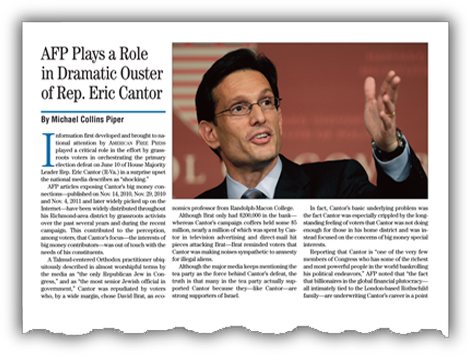
By Michael Collins Piper —
Information first developed and brought to national attention by AMERICAN FREE PRESS played a critical role in the effort by grassroots voters in orchestrating the primary election defeat on June 10—by a little-known, cash-starved challenger—of House Majority Leader Representative Eric Cantor (R-Va.), in a surprise upset the national media described as “shocking.”
AFP articles by this writer exposing Cantor’s big money connections—published on November 14, 2010, November 29, 2010 and November 4, 2011 and later widely picked up on the Internet—were widely distributed throughout his Richmond-area district by grassroots activists over the past several years and during the recent campaign, contributing to the perception, among voters, that Cantor’s focus—the interests of big money contributors—was out of touch with the needs of his constituents.
In fact, it was Cantor’s access to big money (and some of it coming, as AFP reported, from dubious sources) that made him a power in the Republican caucus in the House in the first place.
A Talmud-centered Orthodox practitioner ubiquitously described in almost worshipful terms by the media as “the only Republican Jew in Congress,” and as “the most senior Jewish official in government,” Cantor was repudiated by voters who, by a wide margin, chose David Brat, an economics professor from Randolph-Macon College.
Although Brat only had $200,000 in the bank—whereas Cantor’s campaign coffers held some $5 million, nearly a million of which was spent by Cantor in television advertising and direct-mail hit pieces attacking Brat—Brat reminded voters that Cantor was making noises sympathetic to amnesty for illegal aliens.
Although the major media keeps mentioning the tea party as the force behind Cantor’s defeat, the truth is that many in the tea party actually supported Cantor because they—like Cantor—are strong supporters of Israel.
In fact, Cantor’s basic underlying problem was the fact Cantor was especially crippled by the longstanding feeling by voters that Cantor was not doing enough for those in his home district and was instead focused on the concerns of big money special interests.
Reporting that Cantor is “one of the very few members of Congress who has some of the richest and most powerful people in the world bankrolling his political endeavors,” AFP noted that “the fact that billionaires in the global financial plutocracy—all intimately tied to the London-based Rothschild family—are underwriting Cantor’s career is a point that cannot be taken lightly.”
AFP pointed out that Cantor was “unique among House members: While most members rely on campaign contributions mainly from their own congressional districts, Cantor has an unusually expansive array of contributions pouring in from across the country.”
For example, one of Cantor’s federal election filings, recorded at campaignmoney.com, shows he received 146 contributions from New York donors. In contrast, only 36 donations from New York went to Cantor’s ostensible senior partner in the Republican takeover of the House, Rep. John Boehner, who—prior to becoming House Speaker—had been a top-ranking GOP congressional figure for more than a few years. Yet, even Boehner could not rival Cantor in the number of out-of-state cash contributions.
AFP then provided a brief sampling of Cantor’s contributors from New York State alone, demonstrating the real clout—and the big names—who were bankrolling him:
• Kenneth Bialkin, a mob legal mouthpiece, former national chairman of the Anti-Defamation League of B’nai B’rith, former chairman of the Conference of Presidents of Major American Jewish Organizations, and now chairman of the America-Israel Friendship League, s a Council on Foreign Relations (CFR) member. The CFR is the New York-based offshoot of the London-based Royal Institute for International Affairs, the Rothschild empire’s foreign policy arm;
• Gary Cohn, president and chief operating officer of Goldman Sachs, the infamous Wall Street investment bank whose financial schemes are well known to many Americans who’ve seen their pensions plundered;
• Steven Drucker of Charmer Sunbelt, a massive liquor conglomerate that has grabbed control of various facets of the U.S. spirits industry;
• Lewis M. Eisenberg who, as a former Goldman Sachs partner, is perhaps best known for serving as chairman from 1995 to the pivotal year of 2001 of the Port Authority of New York and New Jersey—at which time the authority turned World Trade Center (WTC) ownership over to international wheeler-dealer, Larry Silverstein, who had the WTC twin towers well insured and suspiciously made billions from the 9-11 attacks;
• Henry Kravis, a member of the CFR and Bilderberg group who was one of the famous “junk bond kings” of the 1980s through his Kohlberg-Kravis-Roberts partnership;
• Ronald Perelman, billionaire head of the Revlon cosmetics empire. He also heads a far-reaching network of radio and television stations. At one point he was said to have been the richest man in America;
• James Tisch, another CFR member and a scion of the billionaire Tisch family who bought control of CBS in the 1980s.
These were just a few of the powerful out-of-state figures who were channeling funds to Cantor’s political enterprises. Two of Cantor’s other notable national contributors were:
• Jeffrey Epstein of California, chief financial officer of the Oracle Corporation, the fiefdom of Larry Ellison, who rose to fame in the 1970s working on a database for the CIA (named “Oracle”). After 9-11, Ellison offered to donate software to the U.S. government to help set up a national identification database, from which national ID cards for American citizens would be issued;
• Sheldon Adelson of Las Vegas, the modern-day incarnation of the late Meyer Lansky, longtime chief of the Jewish crime syndicate. Adelson, today, is one of the GOP’s biggest (and best known) financial backers.
Growing awareness of Cantor’s unusual big money connections played a pivotal part in his ultimate election defeat. AFP is pleased that the information it brought to light helped play a part.
Michael Collins Piper is an author, journalist, lecturer and radio show host. He has spoken in Russia, Malaysia, Iran, Abu Dhabi, Japan, Canada and the U.S.


